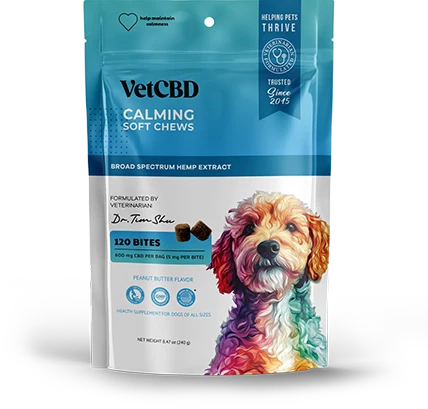
What Can You Give a Dog for Discomfort?
Share
Did you know it’s very easy for your dog to be in discomfort without you knowing? It’s true. Dogs are experts at concealing discomfort, which may date back to their ancestral roots of being in the wild. In the wild, discomfort is equated to weakness, so a wild dog that showed it was in discomfort was the perfect prey for larger predators.
Though our canine pets are now housebroken and tamed, they still have many of the same traits and qualities of their cousins from long ago, and one of these is the ability to tolerate a high level of discomfort without showing they are suffering.
As such, if you see signs of discomfort in your dog, it's fair to say they aren't feeling like their usual selves. By the time a dog may display symptoms of discomfort, they will certainly need to seek medical attention.
There are numerous reasons why a dog may be experiencing discomfort and swelling. Here are some of the most common.
- Accidents. Your dog could have had an accident without you knowing. Jumping off or onto a piece of furniture wrong, a slip down the stairs, or bumping their back against a low bed are all common injuries that can give your dog some discomfort and swelling in a localized area.
- Aging. Age-related joint deterioration is a condition wherein the cartilage between the joints wears down and creates discomfort during movement, decreasing your dog’s overall mobility, and sometimes their quality of life.
- Dental issues. If your dog’s teeth haven’t been cleaned and are full of decay, they may resist food and/or treats because it can be intensely uncomfortable to chew. They may also experience swelling in their gums.
- Infections. Some types of infections can cause discomfort for your pup. Skin infections from bites or puncture wounds can cause swollen lumps, and internal infections can also put your dog in discomfort.
- Limping, favoring legs or paws, or refusal to move at all.
- Lack of normal mobility; dogs that normally run aren’t running, dogs that normally jump on and off furniture refuse to do so.
- Decreased appetite. Skipping meals or lack of interest in treats.
- Whining, whimpering, especially when touched or petted in certain areas where discomfort may be present.
- Aggressive behavior toward you, other people, or other animals.
What are NSAIDs and How Can They Help Your Dog?
When a human has discomfort and/or swelling, we turn to medications like acetaminophen and ibuprofen, i.e. Tylenol and Advil. These medications alleviate us fast, and help us feel better. As such, it may be tempting to do a quick Google search and try to administer these types of medications to your dog, but this is a huge no-no. Medications that are safe for humans are oftentimes toxic to animals, so you should never attempt to give your dog the same medications you take for discomfort and swelling. Your veterinarian can prescribe your dog medications for discomfort. Some of the most common types of drugs prescribed to canines for discomfort and swelling are nonsteroidal anti-inflammatory drugs, or “NSAIDs.” These drugs provide comfort for your dog and are often a necessary part of their treatment plans. However, they are not without side effects, and some side effects, especially those associated with long term usage, can be extremely undesirable. Side effects of NSAIDs include:- Vomiting
- Diarrhea and/or tarry stool
- Kidney and liver damage
- Decreased appetite
- Lethargy
- Skin lesions and scabs
What Are Natural Solutions That Can Help My Dog?
While NSAIDs certainly serve a purpose as directed by your veterinarian when needed, some pet owners and veterinarians look for additional ways to help provide comfort to dogs who need it. The use of all-natural supplements has been in veterinary medicine for years, but in the last decade, the number of pet owners who administer supplements to their dogs has increased dramatically. Just as humans take supplements to support different systems in their bodies, dogs can benefit from supplementation, too. Some of the most popular supplements that can help soothe your dog include:- Turmeric. Turmeric can soothe minor everyday stiffness and other musculoskeletal discomforts.
- Capsicum. Capsicum has been used for decades to soothe discomfort and can have a temporary but strong effect.
- Cannabidiol. Cannabidiol is an all-natural plant-based extract that can support your dog's bone and cartilage health, can promote healthy bone and muscle health, and has mild calming and soothing properties.
Can CBD Help Soothe My Dog?
Cannabidiol, or “CBD” is one of over one hundred plant-based chemical compounds found in the leaves, stems, and flowers of the cannabis-sativa plant. CBD is non-intoxicating, and will not cause your dog to feel impaired. Full-spectrum CBD oils are the most beneficial form of CBD as they contain all usable phytonutrients of the cannabis-sativa plant, which allows the CBD oil to produce the entourage effect. The entourage effect occurs when all parts of the plant work together synergistically to produce maximum plant benefit for your dog. CBD oil is can be beneficial for a dog for the following reasons:- CBD oil can provide comfort and temporary soothing. CBD can ease occasional everyday stiffness and irritation caused by overexertion, and provide temporary comfort for minor everyday discomforts without coming with harsh side effects.
- CBD oil supports healthy joint mobility so your dog can keep running and playing with joints to support him.


